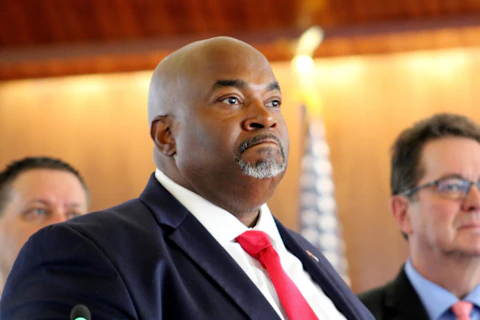Before President Lyndon Johnson signed legislation that created the public health insurance programs in 1965, Black people were shut out of health care.
Medicare and Medicaid—the healthcare programs serving more than 134 million Americans—turn 55 today. And while most people know them for providing health care for those most in need, these programs have benefited many lives in one specific way that is less often discussed.
As a cardiologist and Black American, I know they directly improve health care on both sides of the stethoscope, by breaking down access barriers for Black patients—and also for Black doctors like me to help heal people.
Before President Lyndon Johnson signed legislation that created Medicare and Medicaid in 1965, Black people were shut out of health care.
Jim Crow laws and the separate-but-equal fiction of the 1896 Plessy v. Ferguson Supreme Court ruling segregated schools, lunch counters, buses, and hospitals. A 1917 Mississippi law pushed Black patients into separate entrances at hospitals and compelled physicians to treat white patients first before Black patients. A 1915 Alabama law banned “any white female nurse” from treating Black male patients. In northern states, Black physicians effectively weren’t allowed to practice in many majority-white hospitals.
Then came Medicare, which originally provided health care for those 65 and older, and Medicaid, which originally insured Americans relying on financial assistance. Medicare also directly expanded the ranks of Black physicians in hospitals because the law—which created a market of new customers for hospitals in the form of federally insured older Americans—told hospitals that they could only get their piece of the very lucrative pie if they desegregated.
Had Medicare not ended the apartheid of U.S. hospitals, I might not be a doctor today. Of more than 860,000 total physicians, a quarter-million physicians of color practice medicine in America now thanks in large part to this lesser-remembered aspect of Medicare.
Outcomes for patients have also improved as a result of Medicare and Medicaid. Infant and maternal mortality have slowly improved for Black mothers and their children. When the Affordable Care Act became law and expanded Medicaid eligibility to more low-income individuals, patients became more likely to seek care earlier before a chronic condition like heart disease becomes life-threatening. Medicare has helped older Americans and people with disabilities, especially low-income individuals, access regular care.
While these programs have helped expand health access for Black people and other minorities, progress has stalled and even reversed since President Donald Trump took office in 2017.
RELATED: Trump Said He Wouldn’t Cut Medicaid. This New Plan Cuts Medicaid.
The Trump administration’s efforts to turn Medicaid into a block grant program would shut out low-income families and raise medical costs for them, which is especially damaging when the COVID-19-related recession has put millions of Americans out of work. Between February and May, 5.4 million people lost their employer-provided health insurance, including more than 600,000 in Florida, 659,000 in Texas, 178,000 in Georgia, and 47,000 in Arizona—some of the hardest-hit COVID-19 states.
Texas, Georgia, Arizona and Florida are also plaintiffs in a wrongheaded lawsuit to eliminate the ACA, a Trump-backed case now before the U.S. Supreme Court. If the ACA is struck down, millions of Americans with pre-existing conditions ranging from asthma and arthritis to HIV/AIDS and heart diseases could see their insurance companies stop covering them or charge higher premiums and other costs. The Trump administration can and should drop its support of the lawsuit, signalling that it stands with Americans struggling through a pandemic, job losses, and profound uncertainty.
RELATED: Trump Wants to ‘Terminate’ Health Care for Millions During a Pandemic
A number of the states suing to terminate the ACA haven’t even fully utilized it by expanding Medicaid. My home state of Florida is home to 2.7 million uninsured Black people who could have health care if Florida expanded Medicaid eligibility under the ACA. If Texas and Georgia expanded Medicaid, 5.6 million Black individuals would have health coverage. As this pandemic spreads, it’s become clearer than ever that these disparities harm us all.
Although Medicaid and Medicare have significantly improved access, health outcomes remain unequal. Black people are still more likely to die from heart disease than white people. Latinx people are more likely to die from diabetes compared with white people. Astoundingly, Black women are almost three times more likely to die during childbirth than white women.
RELATED: Landmark Legislation Seeks to Reduce Black Maternal Health Risks
COVID-19 forces us to look at how this virus disproportionately harms Black and Latinx people, who are three times more likely to get sick compared with white people, and Native Americans, who have the highest hospitalization rates. The systemic racism and discrimination being protested across America is another factor that harms the health of people of color.
To build on the progress Medicare and Medicaid have made, we must address the remaining barriers to access and social determinants of health outcomes. This means making working conditions safer for Black and Latinx people who are more likely to work retail jobs, agriculture, and transportation—often low-wage jobs that don’t provide paid sick days and adequate health coverage. This means reducing air pollution, which is more common in minority communities and increases rates of respiratory diseases, and eliminating the lead that poisons their water.
Broadening Medicare eligibility, expanding Medicaid to all states and removing self-sabotaging barriers such as work requirements are necessary conditions to improve the health of all Americans, especially Black people. To overcome generations of healthcare injustices and mistrust, hospitals and medical providers can embrace team-based models of care, with registered nurses, dieticians and social workers of color, to ensure that Black and brown patients are heard, understood and fully cared for.
RELATED: Why You Should Care About Medicaid Cuts Like the Michigan Doctor Who Confronted Pence
And our leaders must stop propagating racist words and ideas, especially at the height of a global pandemic that, in six months, has killed 150,000 Americans and sickened more than 4 million. Politicians who use phrases like the “China virus,” who falsely blame COVID-19 on migrant workers, and who inaccurately ascribe higher COVID-19 infection rates among Black people to lack of personal hygiene are spreading misinformation that dehumanizes and harms individuals and undermines access to care.
On this birthday of Medicare and Medicaid, our nation must finally face our healthcare system’s underlying chronic conditions by working toward honoring the value of and caring for every life.




